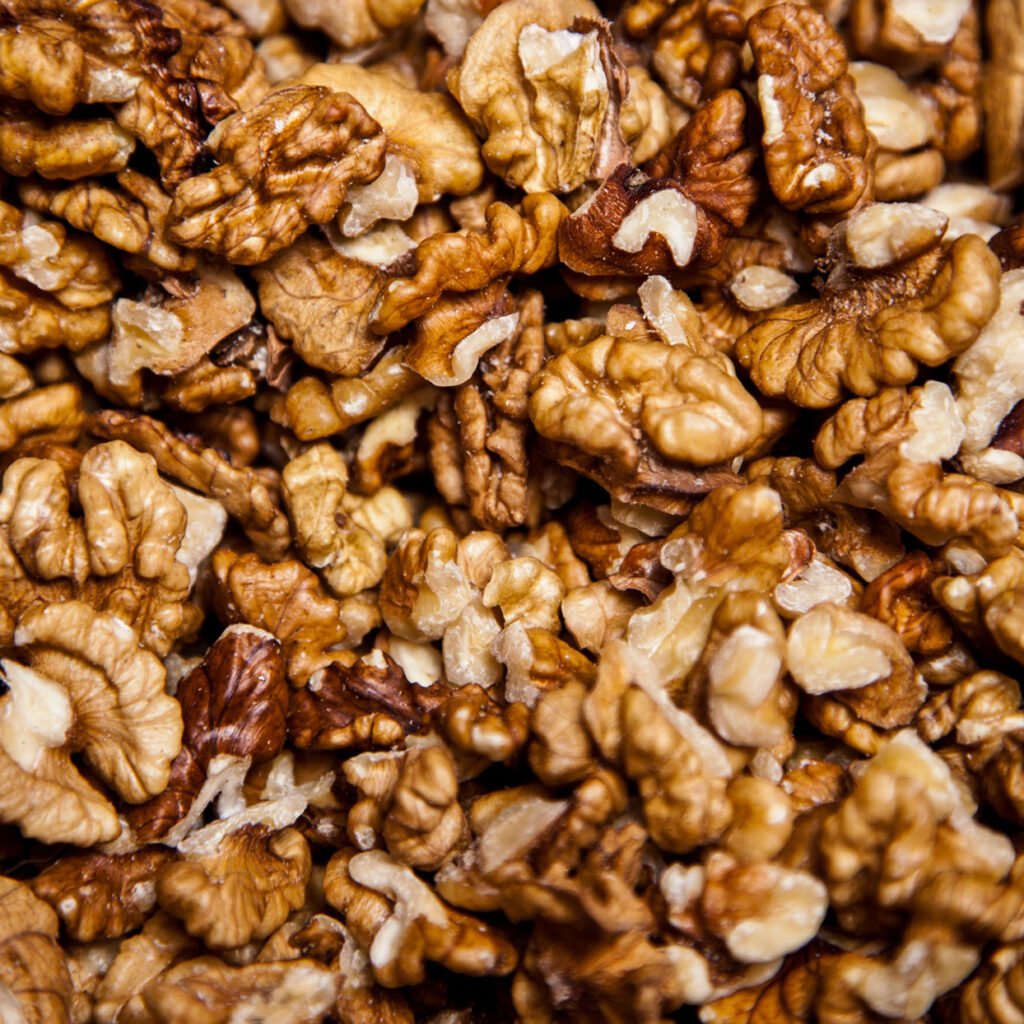Walnuts
Walnuts are a type of tree nut that are widely consumed for their nutritional value and health benefits. In this article, we will explore the various health benefits of walnuts, including their role in heart health, brain function, and cancer prevention.
What are Walnuts?

Walnuts are the edible seeds of the Juglans regia tree, which is a species of deciduous tree native to the regions of Central Asia and the Mediterranean. They are typically harvested in the fall and are commonly consumed as a snack or used as an ingredient in a variety of dishes, including baked goods, salads, and cereals.
Nutritional Value of Walnuts
Walnuts are packed with essential nutrients, including protein, fiber, healthy fats, vitamins, and minerals. One ounce (28 grams) of walnuts contains the following:
- Calories: 185
- Protein: 4 grams
- Fat: 18 grams
- Carbohydrates: 4 grams
- Fiber: 2 grams
- Vitamin E: 1% of the Daily Value (DV)
- Magnesium: 11% of the DV
- Phosphorus: 8% of the DV
Health Benefits of Walnuts
1. Heart Health
Walnuts are high in healthy monounsaturated and polyunsaturated fats, which have been shown to improve cholesterol levels and decrease the risk of heart disease. Additionally, walnuts contain antioxidants that can help prevent inflammation and oxidative stress, both of which are risk factors for heart disease.
2. Brain Function
Walnuts are a good source of alpha-linolenic acid (ALA), an omega-3 fatty acid that is essential for brain function and development. Studies have shown that consuming walnuts may improve cognitive function and memory.
3. Cancer Prevention
Walnuts contain several compounds that have been shown to have anti-cancer properties. For example, the polyphenols found in walnuts may help prevent the growth and spread of cancer cells.
4. Weight Management
Despite their relatively high calorie content, research suggests that consuming walnuts may actually help with weight management. This is likely due to the fact that walnuts are high in protein and fiber, both of which can help you feel full and satisfied.
5. Diabetes Management
Walnuts have a low glycemic index, meaning they are less likely to cause blood sugar spikes than other foods. Additionally, walnuts may help improve insulin sensitivity and decrease inflammation, both of which are important factors in managing diabetes.
How to Incorporate Walnuts into Your Diet
There are many ways to incorporate walnuts into your diet, including:
- As a snack: Try keeping a bag of walnuts in your purse or desk for a quick and healthy snack.
- In baked goods: Walnuts are a great addition to muffins, breads, and other baked goods.
- In salads: Add some crunch to your salads by topping them with chopped walnuts.
- In oatmeal: Add some walnuts to your morning oatmeal for a boost of protein and healthy fats.
- In smoothies: Blend walnuts into your smoothies for a creamy texture and added nutrition.
Conclusion
Walnuts are a delicious and nutritious addition to any diet. They are packed with essential nutrients and have been shown to provide a range of health benefits, including improved heart health, brain function, and cancer prevention. So, next time you’re looking for a healthy snack, reach for a handful of walnuts!
- Are walnuts high in calories? Yes, walnuts are relatively high in calories, but they are also packed with essential nutrients and can be a healthy addition to your diet
- Can consuming walnuts help with weight management? Despite their relatively high calorie content, research suggests that consuming walnuts may actually help with weight management due to their high protein and fiber content.
- How much walnuts should I eat per day? The recommended daily serving size for walnuts is one ounce, or about 14 halves.
- Are walnuts good for heart health? Yes, walnuts are high in healthy monounsaturated and polyunsaturated fats, which have been shown to improve cholesterol levels and decrease the risk of heart disease.
- Are walnuts safe for people with nut allergies? No, walnuts are a type of tree nut and can cause severe allergic reactions in people with nut allergies. If you have a nut allergy, it is important to avoid all nuts, including walnuts.
Lorem ipsum dolor sit amet, consectetur adipiscing elit. Ut elit tellus, luctus nec ullamcorper mattis, pulvinar dapibus leo.
Lorem ipsum dolor sit amet, consectetur adipiscing elit. Ut elit tellus, luctus nec ullamcorper mattis, pulvinar dapibus leo.





